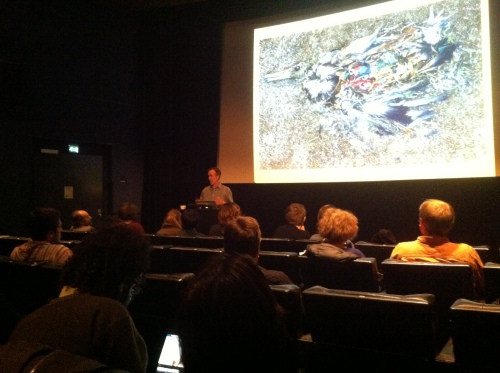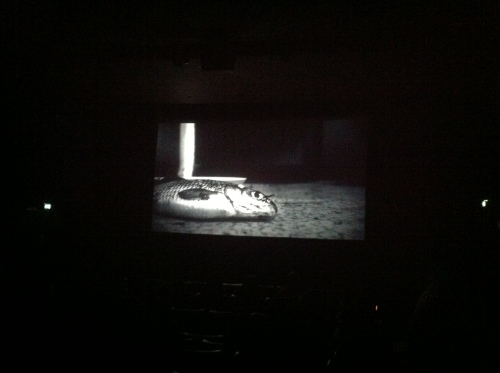Challenging the Status Quo: Research, Writing & Activism
by johangardebo
Workshop on Writing and Activism at KTH Environmental Humanities Laboratory, Stockholm, 8 April 2014. Organisers: Marco Armiero and Isabel Pérez. Presenters: Rob Nixon, Salvatore Paolo de Rosa, Stefania Barca and Rauna Kuokkanen. Workshop held in relation to the film-festival Tales From Planet Earth.
The workshop in Stockholm concerned writing and combining research with activism. The forum was academic, and it may have been for this reason that Marco Armiero began by describing Rob Nixon’s “Slow Violence (2011) as an ambition to encapsulate Foucalt’s tension between telling the truth and proving the truth. Another paraphrase was made to to Carl Ginzburg (1991) on the relevance of studying “non-existent events”, i.e. to find things not recognised in society’s everyday story of what belongs to history.
Another piece by Ginzburg that excellently exemplifies this is The Cheese and the Worms (1980), but we had plenty of readings as it were for this workshop to reach further. In “Dancing with Professors” (2001) Limerick argues that academic prose is neither stimulating nor competitive in reaching larger groups of readership.
Does discussion need to be closed? And must communication have jargon? – Patricia Nelson Limerick
A change in language could allow greater access to academia. But it seems also that Limerick goes after the disciplines (and disciplining of writing). It is inadequate to describe this as a branch to which academics become wired – it is just as much a nest in which scholars are hatched and acquire wings to fly. What young scholars need is not to eat ones parents (professors) but to find platforms (labs?) for trial-and-error writing.
If moving on from what is “competitive” towards what is “meaningful” in academia, we touch upon activism and research – two areas tied together in a Gordian knot. On the one hand, you need adress matters of concern; On the other hand, research should be original and be able to follow problems and questions wherever curiosity leads it. And if you needs must push an agenda then there is always politics.
Nixon’s way of cutting this knot is instead by threading his research through it – “situating” his position (coming from a white working-class family in apartheid South Africa. Indeed, his current career as middle-class scholar had its foundations laid by his frugal parents. In “Barrier Beach, Nonfiction” (forthcoming, 2014), Nixon explores how topography is layered with social behaviours and memories of people. This would also explain why certain groups are restricted in certain topographies and argues that a move from dispossession towards self-possession requires stories of places to dig into its sediments. Writing is in this sense a means to remake topographies, and hence the choice of soil and what text to plow into it is very much about activism. Any literary critique would rejoice at having such powers.
But why does a person seek to appropriate or represent a collective? And if writing for groups, you need rely on simplification and double-viewpoints of audience. Words are words in context. Here there are many common mistakes.
Do not overestimate what your audience knows, but do not underestimate what your audience understands – Rob Nixon
Similarly, do not disregard the opinions of the community you are writing for – this is to impose ones analysis on the community. Rauna Kuokkanen, writing on Indigenous peoples in Canada and Scandinavia, underlines that academic papers can, and need dare to, explore new ideas. For one thing, a community is not homogenous and in this sense the scholar may legitimately bring new perspectives into it. This does require a sense of humility on part of the scholar.
Another is to mistake activism and public writing – these overlap but are not synonymous. One aspect of this, perhaps showing how myopic academia can be, is that we neither learn to distinguish nor practice different types of writing than those promoted by education systems. Great Britain used to value public writing, but metrication of academia segregated Journalism and Academia – the former becoming less informed; the latter less engaged.
Solutions may be to fill the gaps, of collaborative science and public experiences relating to the research topic. No, what was discussed was not to increase the amounts of surveys but the forums of discussing the research and topics at hand. I recall Habermas having proposed something similar, so probably this has already been tried to less success than hoped for (the world is not a seminar room).
Another is to not waste your ignorance. Sverker Sörlin once advised me and colleagues to write the introductions of dissertations straight away. The same is probably true for any text or argument. The point is to remember ones ignorance – to treasure and dramatise it. Like Virgil with Dante, escorting your reader through an arch of discovery. To share confusion, and bit by bit guide ones way out of the Inferno.
This probably involves accepting that the body of work will be impersonal. But to use, again as Nixon suggests, the personal as counterpoints to blend personality with methodology – voice and idea.
And lastly, to make things concrete – to write a 1000 words is to stop at 999 words. Pieces of work can be rewritten to “public versions” and tried out in group. “Am I hooked in the first sentence?” This question, coming back to Limerick, what academics could afford spending more time on.
Stepping back a bit, why is this important (I believe it is)? Many researchers coming to environmental issues have had their fair share of troubled thinking.
How can we understand this problem? What would humanity and life on Earth be like if we do not? What means and solutions are available? – Environmental humanist (pretty much every monday morning)
Despite the vast input on activism, the most rewarding component of the workshop “Challenging the Status Quo” was to actually practice new types of writing. This was lead by Isabel Pérez, and I re-post the outline in its entirety for reproduction (do try this at home):
Writing exercise
- 2 minutes. Write to describe the room, with your senses.
- 2 minutes. Re-use three of the words written and write about anything
- 1 minute. Relate to your our work: how would you describe your research with 5 adjectives.
- 3 minutes. A politician wants to change the world using your research. Select 3 of the 5 adjectives, use them to summarise your research for her to use in a campaign
- 3 minutes. A popular science magazine holds competition for most interesting dissertation. Write a “first sentence” to submit to this competition.
References
Ginzburg, Carlo, The Cheese and the Worms: The Cosmos of a Sixteenth-Century Miller, London: Routledge, 1980.
Ginzburg, Carlo, “Checking the Evidence: The Judge and the Historian”, in Critical Inquiry, Vol. 18, No. 1, Autumn, 1991.
Limerick, Patricia Nelson, “Dancing with Professors: The Trouble with Academic Prose”, in Something in the Soil: Legacies and Reckonings in the New West, W. W. Norton & Company, 2001.
Nixon, Rob, “Barrier Beach Nonfiction in Greg Garrard, ed., The Oxford Handbook of Ecocriticism, Oxford Handbooks (forthcoming 2014).
Nixon, Rob, Slow Violence and the Environmentalism of the Poor, Harvard University Press, 2011.


